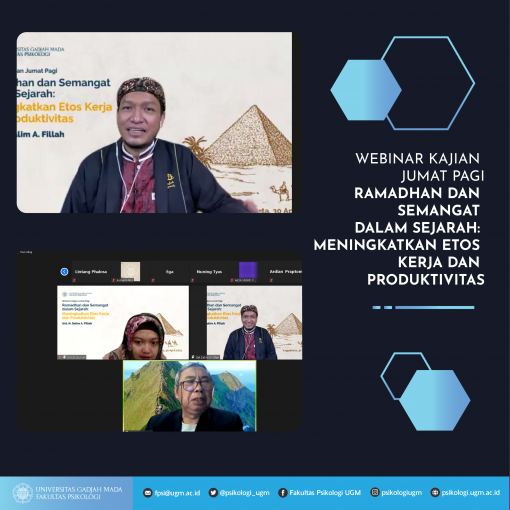
Faculty of Psychology UGM on Friday (30/4) held a Friday Morning Study Webinar with the topic “Ramadan and the Spirit in History: Improving Work Ethics and Productivity”. This event is a routine activity held by the Faculty of Psychology UGM during the month of Ramadan on Friday. This event was preceded by the reading of the divine kalam and continued with a speech by Dr. Yuli Fajar Susetyo, M.Sc., a psychologist as the deputy dean of finance, assets and human resources. Through his remarks, Yuli hopes that this event can foster the enthusiasm of children today who tend to prefer fun things to be more struggling.
Then the event continued with remarks, impressions, and messages given by Dr. Esti Hayu Purnamaningsih, M.S. The remarks, impressions, and messages conveyed by him coincided with his retirement period which fell on April 30, 2021. Esti is one of the teaching staff who has been actively teaching since 1985 and has made great progress with various deans, both in academia and administration. “Many things that I felt, especially during my time at the Faculty of Psychology, were extraordinary togetherness, solidarity, intimacy, brotherhood, mutual support, mutual encouragement, mutual motivation as well as cooperation which all support for our progress together”. The hope is that these things will continue and become a strength to advance the Faculty.
Finally, Esti advised other teaching staff to continue to improve their abilities from the various opportunities that can be taken. Later on, these abilities can be things that can advance the Faculty. In addition, Esti also advised that working happily because being happy will help achieve a goal and being grateful is one way to be happy.
Next, entered the main event of the Friday Morning Study Webinar, which was attended by ustadz Salim Afillah. He conveyed that a scholar who is Faqih and an expert in Medical Sciences, Imam Syafi’i said that in fact the feeling of being full weakens the body, making the body work harder to spend energy digesting these foods and then accumulating them into something that makes a human sleepy and lazy to move . Meanwhile, hunger makes the mind sharp, clears the heart, and makes movements nimble. So when someone feels less productive during Ramadan, basically they may not have fulfilled the Sunnahs of the Prophet SAW in preparing for the month of Ramadan.
When observed, the Prophet SAW in preparing for the month of Ramadan by paying attention to the physical condition since the month of Rajab by increasing fasting compared to other months. The Prophet (peace and blessings be upon him) used to fast for about 10-11 days in the regular months, fasted more than any other month in the month of Rajab, fasted a whole month in Ramadan, and fasted close to the number of days in Ramadan in the month of Sha’ban.
Imam Nawawi explained that increasing fasting in the month of Sha’ban is the main sunnah. Increasing the fasting months in the month of Sha’ban is important because it is assigned to accompany great worship. Similar to prayers that have both the sunnah ba’diyah and qabliyah, the month of Ramadan also has sunnah ba’diyah and sunnah qabliyah. Sunnah ba’diyah month of Ramadan is fasting for 6 days in the month of Shawwal because whoever completes the fast of Ramadan by following him fasting in the month of Shawwal, it will be written for him as a full year fast. Meanwhile, the sunnah qabliyah in the month of Ramadan is increasing fasting in the month of Sha’ban without any specific provisions regarding the amount.
